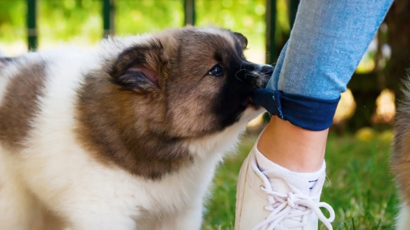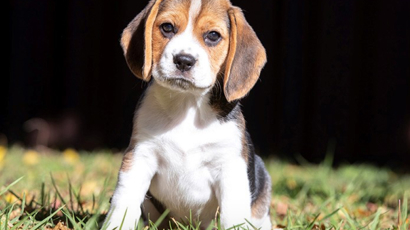Puppy teething

Like humans, puppies have a set of primary teeth that fall out and are replaced with the adult set of teeth. The main difference in dogs, is that the process of teething in puppies occurs at a much faster rate, over just a few months for their secondary set of teeth!
Here’s all you need to know about your puppy teeth stages.
Puppy teeth stages
Your puppy’s primary (deciduous) teeth erupt between 4-6 weeks of age so usually by the time you acquire your puppy, all 28 of the primary incisors, canines and premolars are present.
The primary teeth are then replaced with the secondary (adult) teeth in the order of incisors, canines, premolars and additional molars erupt so that the total number of adult teeth in your puppy’s mouth is 42 (with some individual variation). That’s a lot of teeth considering an adult human has just 32!
| Puppy's Age | Secondary Teeth |
| 12-20 weeks | Incisors erupt |
| 12-16 weeks | Canines erupt |
| 16-24 weeks | Premolars erupt |
| 20-28 weeks | Molars erupt |
By the time your puppy is 7 months of age, he or she will usually have the entire set of adult teeth! So, teething in puppies is fast tracked over just 4 months compared to the slow process in humans.
Looking after your puppy’s teeth
At each puppy health examination, your vet can assess your puppy’s teeth and look for problems such as:
- Malocclusions where teeth are in the wrong position causing problems
- Tooth fractures which can lead to tooth root abscesses
- Retained deciduous teeth leading to overcrowding
- Unerupted teeth which can lead to large cysts forming in the jaw bones
Some of these problems may require a dental procedure to correct, particularly retained deciduous canine teeth. These should be extracted by your vet under an anaesthetic if they have not fallen out by 6 months of age, or your puppy risks permanent dental health problems. It is therefore important that your vet examined your puppy’s teeth at approximately 6 months of age to look for puppy teething problems.
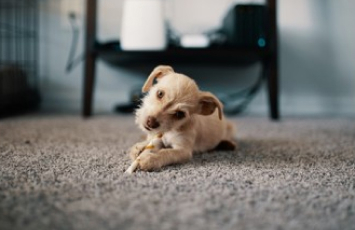
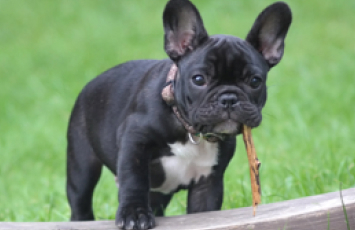
Dental care for puppies
Diet
There is no doubt that diet plays a huge role in dental health care in puppies. In my experience, puppies fed an all wet food diet (no dry food) tend to develop tartar on their teeth and gum disease at a much earlier age than dogs offered dry food as a regular part of their diet. Black Hawk has an excellent range of suitably textured dry food diets balanced for growth in puppies.
Chews
Puppies naturally like to explore their environments with their mouths, particularly during their teething period, so it’s important to provide age appropriate chew toys for your puppy. Supervise your puppy while chewing so that there is no swallowing of chewed inedible items. For edible dental chews, take note of the manufacturer’s recommended age to start these as they can sometimes be too hard for the primary teeth to safely handle.
Bones can sometimes cause fractures in teeth so be sure to discuss these risks with your vet first.
Brushing teeth
There is no doubt that the best way to care for your puppy’s teeth is to introduce tooth brushing into the routine.
In order to make it worthwhile, this needs to be at least every second day, preferably daily.
Make sure your puppy has a positive experience during this learning phase and use a finger brush or a small soft toddler’s tooth brush dipped in something tasty like beef stock to reward them every time the tooth brush is used. You can use a pet dental toothpaste once your puppy is comfortable with the tooth brush but the brushing action is the most of important part. Aim to clean the outsides of the teeth only as your puppy’s tongue will do a pretty good job of the insides.
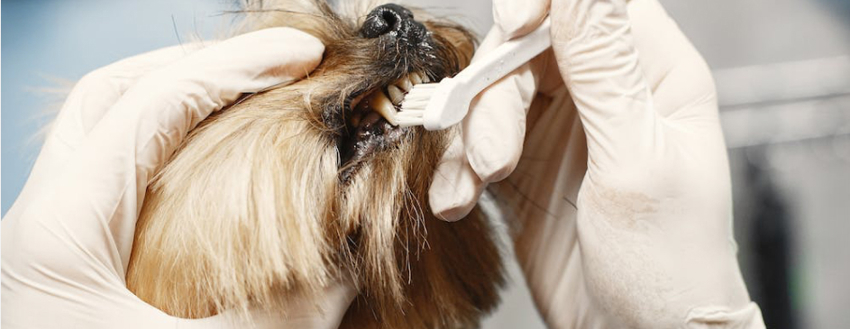
Professional dental cleaning and treatment
At each annual health exam, your vet can assess your dog’s teeth to determine whether it is time for a dental scale and polish, which is performed at the right time, can help avoid extractions later in life. Like humans, most dogs require this dental procedure multiple times in their lifetime to maintain a healthy mouth.
Teething is an important development stage in your puppy’s life so be sure help your puppy get used to oral exams by gently opening and closing the mouth as well as lifting up the gums regularly. By gradually getting your puppy used to oral exams early in life, this will make tooth brushing and veterinary exams much easier in the future.

